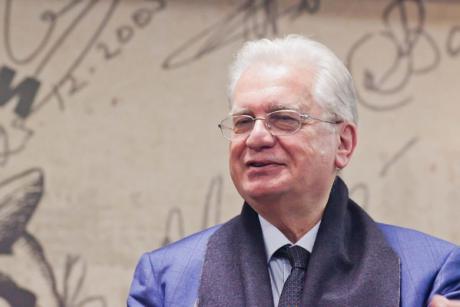
Mikhail Piotrovsky, the director of the Hermitage Museum who voiced support for Russia’s invasion of Ukraine last yeargave a new interview describing war as “a means of cultural exchange” that can be mutually enriching for cultures in conflict.
Talk to Rossiiskaya Gazetaan official journal of the Russian government, in a interview published on April 2Piotrovsky reiterates his position that “it is important for me to be with my country when it makes a historic choice”, despite the criticism he has received “from all sides”.
The veteran museum director, whose academic expertise is in Arab and Islamic culture, acknowledges that the historic wars “of course partially destroyed the culture”, but says that “in general there was a cultural exchange”. He gives the example of the Crusades: “The Muslims learned from the Crusaders how to build mighty fortresses, and the Christians began to bathe again in the baths, remembering the Roman baths… And they [Christians] borrowed luxuries: the general level of culture among Muslims was then higher than in Europe.
Piotrovsky is a longtime supporter of Russian President Vladimir Putin, a frequent visitor to the Hermitage in St. Petersburg. His son, Boris Piotrovksy, is also involved in Russian politics as deputy governor of Saint Petersburg; last year he traveled to Russian-occupied Mariupol, the beleaguered port city in eastern Ukraine.
Elder Piotrovsky now tells Rossiiskaya Gazeta that the war helps to reinforce a sense of “national self-awareness” in Ukraine. “See how powerful the Ukrainian nation is forming,” he says.
Putin, who initially promised a swift campaign to “denazify” Ukraine, changed his rhetoric to indicate that Russia will be at war with the West indefinitely. Piotrovsky says that the “new generation” of Russians must understand that “the comfort of before does not exist anymore”, not only because of “military operations”, but also because of “internal challenges”.
In his latest monthly column for a St. Petersburg newspaper, also published in English on the Hermitage websitePiotrovsky insists on the need for the museum to strengthen cultural ties with the Middle East and China because “we are changing the vector of attention, we are turning away from Europe a little”.
He references a recent visit to Muscat, Oman, and a number of new international collaborations being discussed. “We are in negotiations with Oman on restoring full museum relations,” he wrote. “Restaurateurs come to us from there to learn. Together, we will help preserve Syrian monuments… We are in talks with China to participate in an exhibition on the tea ceremony; we are preparing the Hermitage Days in Belgrade… There are quite a few countries where we are well understood.
